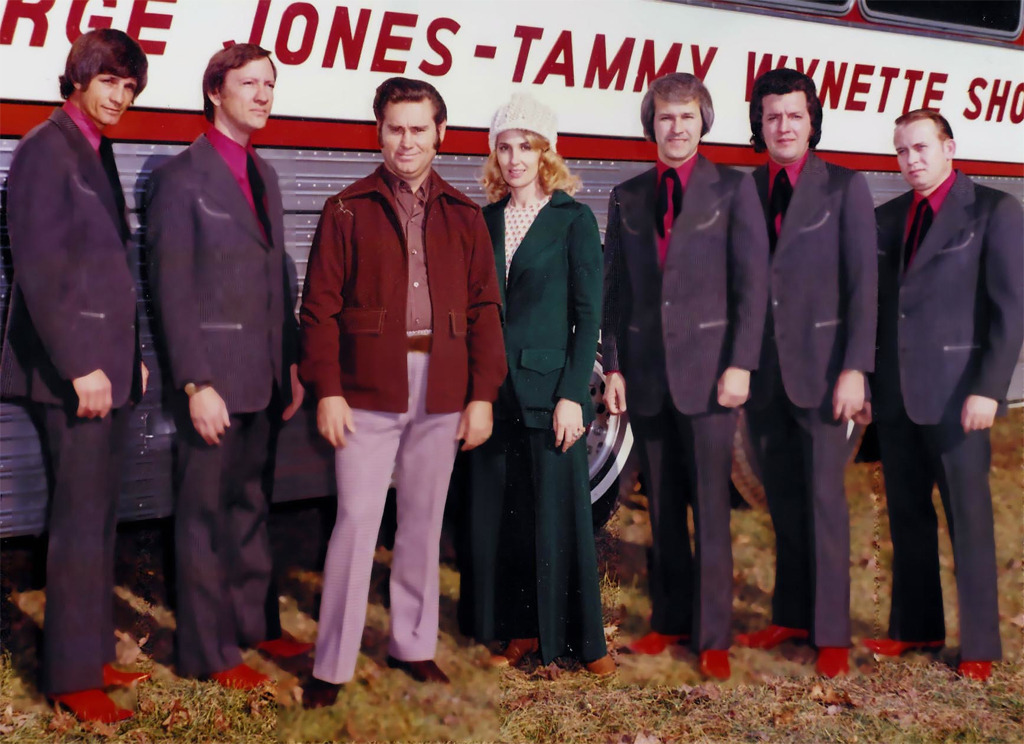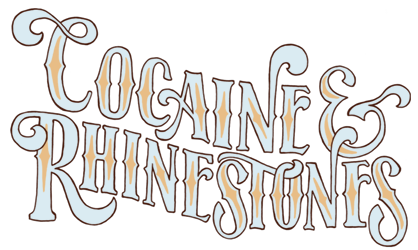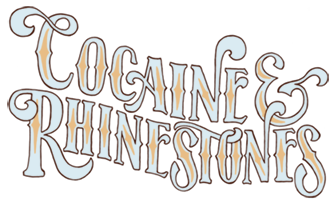
Tammy Wynette’s “Stand by Your Man” is one of the most well-known recordings in the English language. It was also a plastic explosive detonated at a sea change moment in United States politics and culture. Look around. We’re still picking up the pieces.
Contents (Click/Tap to Scroll)
- Primary Sources – books, documentaries, etc.
- Transcript of Episode – for the readers
- Liner Notes – list of featured music, online sources, further commentary
Primary Sources
In addition to The Main Library and the Season 2 Library, these books were used for this episode:
Transcript of Episode
As part of my agreement with Simon & Schuster to publish a book adaptation of Season 2, the transcripts that have been freely available for over a year will be temporarily removed from this website. Please consider ordering a copy of Cocaine & Rhinestones: A History of George Jones and Tammy Wynette through your favorite local bookstore or requesting that your local library order a copy you can check out.
Liner Notes
Excerpted Music
This episode featured excerpts from the following songs, in this order [with links to purchase or stream where available]:
- Johann Strauss II – Wein, Weib und Gesang, Op. 333 [Amazon / Apple Music]
- Tammy Wynette – “Stand by Your Man” [Amazon / Apple Music]
- Tina Turner – “Stand by Your Man” [Amazon / Apple Music]
- Motörhead & Wendy O. Williams – “Stand by Your Man” [Amazon / Apple Music]
- Chippette (Alvin & The Chipmunks) w/ Tammy Wynette – “Stand by Your Man” [Amazon / Apple Music]
- Lyle Lovett – “Stand by Your Man” [Amazon / Apple Music]
- Big Brother & The Holding Co. – “Piece of My Heart” [Amazon / Apple Music]
- Tammy Wynette – “Singing My Song” [Amazon / Apple Music]
- Tammy Wynette – “The Ways to Love a Man” [Amazon / Apple Music]
- Tammy Wynette – “I’ll See Him Through” [Amazon / Apple Music]
- Tammy Wynette – “He Loves Me All the Way” [Amazon / Apple Music]
- Tammy Wynette – “Run Woman Run” [Amazon / Apple Music]
- The Slits – “Typical Girls” [Amazon / Apple Music]
- Tammy Wynette – “When There’s a Fire in Your Heart” [Amazon / Apple Music]
- Tammy Wynette – “D-I-V-O-R-C-E” [Amazon / Apple Music]
- Bobby Braddock – “D-I-V-O-R-C-E” (demo) [Amazon / Apple Music]
- George Jones – “When the Grass Grows Over Me” [Amazon / Apple Music]
- George Jones & Brenda Carter – “Milwaukee, Here I Come” [Amazon / Apple Music]
- George Jones – “I’ll Share My World with You” [Amazon / Apple Music]
- George Jones – “Where We’ll Never Grow Old” [Amazon / Apple Music]
- George Jones – “Never Grow Cold” [Amazon / Apple Music]
- George Jones – “A Wound Time Can’t Erase” [Amazon / Apple Music]
- Tammy Wynette – “Kids Say the Darndest Things” [Amazon / Apple Music]
Excerpted Video
These videos were excerpted in the episode. For any number of reasons, YouTube (or other sites) may remove them in the future but here they are for now:
Commentary and Remaining Sources
Like I said in the previous Liner Notes, I’ve been dreading releasing these Tammy episodes for a long time. There were definitely some people who had the negative reaction I expected from the first one and I assume this one will be even worse. Look, these episodes are forcing me to say a lot of things I really wish I didn’t have to say because it is stressful to navigate these topics, especially in the year 2021, but I’m not going to compromise the integrity of this show by removing difficult questions from my research process or ignoring the truths I uncover, which will often be messy. I know everyone who’s only familiar with the version of the story in Tammy Wynette’s autobiography will not want to hear anything different but when the person who helped Tammy tell that version of the story tells us the truth is something else, then I have to pay attention to that and I have to look for that something else. When research turns up several informed sources all confirming the same alternate version of events, it would be unethical for me to ignore that. It is not fun for me to debunk a woman’s story about being physically abused, especially when I know she really was physically abused, but I am not allowed to promise the truth as far as I can tell it unless I’m prepared to tell it and that’s the promise I make in every episode. I keep my promises. Again, we’re still quite a few episodes away from it but for everyone who refuses to let go of what they think they know about this story, you need to understand we have a great deal of evidence pointing toward the way Tammy Wynette did react when a man did bruise her face and it was exactly the opposite of trying to hide it with a wig and makeup.
When it comes to the history of the song “Stand by Your Man” given in this episode, I will repeat the disclaimer given in previous Liner Notes of this season: you’re reading me explain how and why history unfolded the way it did. I can like something and still recognize what about it made so many people so upset. Me supplying direct quotes from other people is not me telling you I agree with those people wholesale. Me writing about the problem millions of people have had with this song is not me telling you I hate this song. There are examples of me directly stating a song is bad in most episodes of this podcast, so if anyone feels the need to write me a boring email to say I have wrong opinions then please at least go find one of those instances to make sure you’re yelling at me for an opinion I actually have.
There’s one last thing Tammy sometimes said about this song which I should address: “Daddy made all the decisions. A man’s word was law. That’s what bothers me so much when people make fun of ‘Stand by Your Man.’ That’s all I knew.” This is exactly what you’d hear from many women describing their childhoods in the 1940s and 1950s but whenever Tammy talks about the grandparents who raised her without trying to use them as a shield for “Stand by Your Man,” she always talks about Mama being the more dominant adult in the house. It was Mama who laid down the law at home and who made sure to let Daddy know whenever he messed up. Tammy’s relationship with Mildred was exactly the same. Mildred is who she bumped heads with. Mildred is who chastised her. When Tammy explained why she yelled at George Jones about his drinking, she pointed to the behavior of her mother and grandmother, who made her believe that’s the way a wife laid down the law. So it doesn’t really sound like “a man’s word was law” is how she was raised at all.
I wasn’t able to find specific information on this but I do strongly doubt either Francois I or his sons were imprisoned anywhere resembling our modern concepts of a prison or any sort of gen pop situation. They were probably confined to some room of some castle but I would still say such confinement is what constitutes whether or not a room should be called a “cell.”
At the time of most events discussed in this episode’s intro, Roman Catholicism wasn’t called Roman Catholicism but I backdated modern terminology in order to avoid confusion, which is the same reason I used Muhammad Ali’s chosen name instead of calling him by the name everyone knew him as at the time of his appearance in the movie Requiem for a Heavyweight.
The Art Linkletter clip above is actually from a show called Art and The Kids but it’s the exact same bit and format that he used for decades under the name Kids Say the Darndest Things.
The Alvin & The Chipmunks cover of “Stand by Your Man” does have Alvin on an extended intro but the song is actually sung by the Chipette character. Tammy Wynette is also on the recording.
There are, of course, pinball machines shown in the roughneck country bar scene of Blues Brothers.
It would have been a spoiler to say why it was significant for Lyle Lovett’s cover of “Stand by Your Man” to be placed over the end credits of The Crying Game so I didn’t and won’t do it here.
There is some doubt about whether Tammy Wynette was actually “The First Lady” to sell a million units in country music. Some people think Loretta Lynn probably sold a million units before her and before certain tracking systems were put in place. Patsy Montana’s “I Want to Be a Cowboy’s Sweetheart” probably sold over a million units even earlier than that. If anyone thinks they saw me say Tammy was the first to sell a million, they didn’t. You saw me say her record label started claiming that and calling her The First Lady, which is what happened.
Speaking of First Ladies, Wynette once told a friend of hers that Hillary Clinton refused to shake her hand when Tammy was the surprise guest at a Clinton fundraiser held at Barbra Streisand’s California home, which I assume is the same California home that resulted in the term Streisand Effect discussed in Season 1.
I turned up a little piece of information while researching in the Country Music Hall of Fame and it does not seem to be widely available online, so if anyone has ever wondered who played pedal steel guitar on “Milwaukee, Here I Come,” that would be Lloyd Green.
As for my other sources, Martin Luther’s 95 Theses and Machiavelli’s The Prince were both obviously used for this episode. It’s definitely above my pay grade but I was pretty fascinated to discover that both of these men were basically writing about the same thing at the same time: the difference between a person’s private life and what they project to the outside world. Seems like something a person who’s smarter than me could write a whole book about and I’m surprised nobody has.
My primary sources for all of Season 2 are on the Season 2 library page. Today I’ll talk a little bit about Jimmy McDonough’s biography of Tammy, Tragic Country Queen. The book is essential reading for Tammy Wynette fans who can handle learning the truth but those who can’t will probably wish they’d never read it. As mentioned in the previous episode, Jimmy spent a long time and did a lot of work writing this book. There’s no chance anyone will ever write a more comprehensive biography of Tammy than this one. He also spends a lot of time on George Jones and Billy Sherrill, which I appreciated. I’m sure the letters he periodically writes to Tammy throughout the book would weird out some people but who am I to criticize unconventional storytelling techniques? (Those of you who don’t like the intros in Season 2 will be pleased to learn Jimmy doesn’t talk much about bullfighting or pinball.) There are some chronology problems here and there but I assume that’s a result of him trying to make sense of all the lies he had to sift through while putting the story together. I would also like to make sure and clarify it was not my intention to insinuate any sort of negative opinion toward Jimmy for him not mentioning the photographic proof that Tammy wasn’t trying to hide bruises on her face at the CMA awards because she wasn’t even wearing the type of wig she claims. I totally understand his decision to not discuss that because I didn’t want to discuss it either.
Alright, when the podcast returns, I’ll be covering the period of time when Tammy Wynette and George Jones were married to each other, which is pretty near the center of the labyrinth that is this season, and I think those of you who have been enjoying the intros this time around will be happy with the part of the map I’m showing you at the beginning of the next episode.



